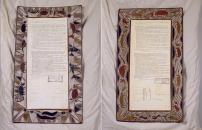 1424194627825605528.jpg
1424194627825605528.jpg
 Reward and Punishment in Arnhem Land 1962-1963
Edgar Wells
,
Canberra
:
Australian Institute of Aboriginal Studies
,
1982
Z1402260
1982
single work
prose
Reward and Punishment in Arnhem Land 1962-1963
Edgar Wells
,
Canberra
:
Australian Institute of Aboriginal Studies
,
1982
Z1402260
1982
single work
prose
 The Yolngu and Their Land : A System of Land Tenure and the Fight for its Recognition
Nancy M Williams
,
Palo Alto
:
Stanford University Press
,
1986
Z1598486
1986
single work
non-fiction
The Yolngu and Their Land : A System of Land Tenure and the Fight for its Recognition
Nancy M Williams
,
Palo Alto
:
Stanford University Press
,
1986
Z1598486
1986
single work
non-fiction
'The Yolngu and their Land is about the Aboriginal system of tenure in the Northeast of Arnhem Land. From an economy based entirely on hunting and gathering, this community of some 1000 Yolngu speakers has become increasingly involved in the international economy. The transformation began after the establishment of a mission station on the land of one of the clans, and was accelerated with the establishment of a large bauxite mine, processing plant, and the attendant creation of a full scale town with a population of 3500 non-Aborigines'.
Source: Publisher's note. (Sighted: 15/06/2009)
 Father of the House : The Memoirs of Kim E. Beazley
Kim E. Beazley
,
North Fremantle
:
Fremantle Press
,
2009
Z1553260
2009
single work
autobiography
Father of the House : The Memoirs of Kim E. Beazley
Kim E. Beazley
,
North Fremantle
:
Fremantle Press
,
2009
Z1553260
2009
single work
autobiography
'Get the inside story of one of Australia's longest serving and most influential Ministers in Federal Parliament. Kim E Beazley threw off the shackles of a poor childhood to become a teacher, a Union Leader and the Member for Fremantle in the Federal Parliament between 1945 and 1977.
'During his time in Parliament he led the reform of Australian education and played a central role in the 1963 Yirrkala Bark Petition against bauxite mining on Yolngu land - a major step forward in the struggle for Indigenous land rights.
'In his own words, Beazley gives us a behind-the-scenes look at the corridors of power displaying the quiet determination and drive that led to his rise to Minister for Education under Whitlam. Beazley died in October 2007 and his son, Kim Beazley Junior, provides the book's introduction with special insight into the man as father and Parliamentarian.' (Publisher's blurb)
 Petitions from Indigenous Australians: Emergence and Negotiations of Indigenous Authorship and Writings
Chiara Gamboz
,
Sydney
:
Faculty of Arts & Social Sciences, UNSW
,
2012
6123743
2012
single work
thesis
Petitions from Indigenous Australians: Emergence and Negotiations of Indigenous Authorship and Writings
Chiara Gamboz
,
Sydney
:
Faculty of Arts & Social Sciences, UNSW
,
2012
6123743
2012
single work
thesis
'This research discusses the negotiations instantiated by Indigenous petitions in Australia. It does so by conceptualising petition writing and reading, by considering the endorsement and commemoration of petitions, and by chronologically canvassing published and previously unpublished petitions addressed by Indigenous peoples from across Australia to government representatives and international bodies before and after Federation, from the mid 1840s to the early 1960s. Drawing on the theoretical contractarian framework developed by Charles W. Mills and Carole Pateman, the dissertation examines petition writing as a way of intervening in a domination (settler) contract and in an exclusionary and dominating white public sphere. This framework accounts for the collective dimension of petitions and for their nature as political instruments of negotiation within relations of domination and subordination. This cross disciplinary study is located within the scholarly work undertaken in Australian historical and literary studies which, especially since the 1990s, have highlighted the value of petitions as documents which record Aboriginal perspectives, and as forms of early Aboriginal writings deserving of critical attention. More broadly, it can also be contextualised within studies of the emergence of an Indigenous political voice and of processes of identity formation. It shares post-colonial studies interest in the relationship between the coloniser and the colonised and it replies to Spivaks question of whether the subaltern can speak. The analysis of the petitions is historically contextualised and it reflects on the venues of the petitions creation (penal system, reserves and missions, urban and rural settings). It highlights the narratives and requests the petitions convey as well as the argumentative strategies employed by the petitioners. It considers the rhetoric of contemporary discourses (political, racial, humanitarian etc) visible in the petitions and the responses to these discourses put forward by the petitioners. The thesis outlines also some features which petitions and Aboriginal protest literature share and the aspect of testimony or memorial these petitions possess. An Appendix collects a sample of the Indigenous Australian petitions upon which the discussion is based. ' (Source: TROVE)
